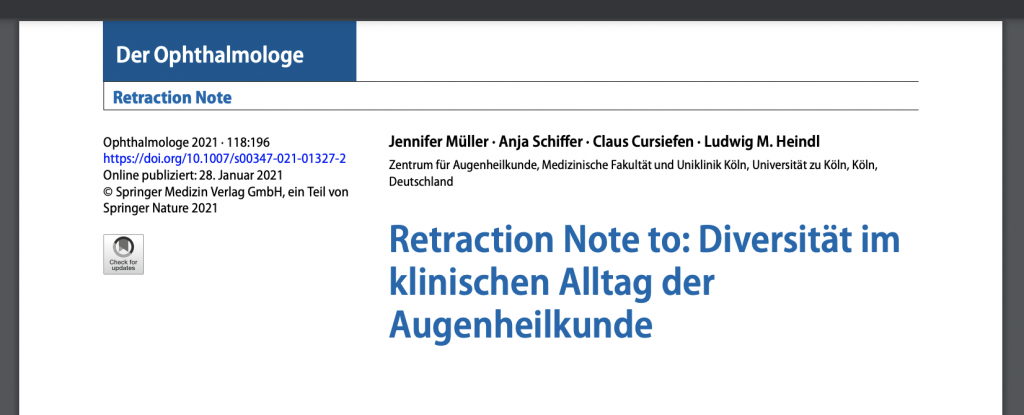
A paper about medical treatment for migrant patients in Germany has been retracted after the authors made unsupported claims that Muslims are “particularly sensitive” to pain.
The paper, titled “Diversität im klinischen Alltag der Augenheilkunde,” or “Diversity in everyday clinical practice in ophthalmology,” in English, was published in Der Ophthalmologe, a German medical journal, in November 2019. It has not yet been cited, according to Clarivate Analytics’ Web of Science.
The original article, penned by ophthalmologists at the Cologne University Eye Clinic, is in German. We ran it through Google Translate to get a sense of its content. The paper begins with a case study of a 52 year-old Turkish migrant, explains how to use smartphone speech translators to overcome language barriers, and highlights cultural differences that physicians should consider while treating migrants.
Elsewhere, the paper makes claims without evidence about Muslim patients in particular. In one section of the paper, titled “Treatment with intercultural competence,” the authors say that “special situations have also shown that Muslims complain of pain beyond the usual level,” and that, as Germans, “you quickly get the impression that they are particularly sensitive.” Another translated passage says that “Muslim patients emphasize their suffering.”
The paper cites eight studies in total, but does not provide a citation for these claims.
A retraction notice was published on January 28th:
The authors have withdrawn this article.
Post-release concerns have been raised about a number of statements in this article that are inaccurate and generalizing.
The authors point out that the article makes no claim to sociological precision and that some passages come from the unfiltered everyday experience of nurses and do not allow generalizations. The authors did not intend to discriminate or denigrate patients in any form.
The literature research carried out prior to publication was inadequate and a number of statements lacked corresponding sources and an appropriate social science context.
Therefore, the authors withdrew the article because it did not meet the criteria of good scientific practice.
All authors agree to this withdrawal.
The study’s first and last authors — Jennifer Müller and Ludwig Heindl — did not respond to requests for comment. In response to an email from Retraction Watch, asking why the authors decided to pull the study, Der Opthalmologe’s editor, Frank G. Holz, forwarded our email to a spokesperson for Springer Nature, who said:
We treat all correspondence in these matters as confidential and it would not be appropriate for us to speculate or comment on the authors’ motivation.
This isn’t the first retraction for far-reaching, ethnic comments in the scientific literature. Last September, Retraction Watch staff penned an article in WIRED about a recent spate of journals that are retracting racist content, including a 2012 article that “linked darker skin to aggression.”
Like Retraction Watch? You can make a tax-deductible contribution to support our work, follow us on Twitter, like us on Facebook, add us to your RSS reader, or subscribe to our daily digest. If you find a retraction that’s not in our database, you can let us know here. For comments or feedback, email us at [email protected].
In case anyone isn’t aware, the same claim has been made about black patients in the US — and of course, it is tied to the well-documented fact that American doctors often belittle or disregard black patients.
“Muslim” is a religion – not a race.
In my youth I had to endure a ridiculous sermon on the subject of “Conversion” – in which the preacher tried to tell his congregation that one undergoes a “physical change” upon conversion to the one true faith (which happened to be Methodism in that particular church).
For the paper to be true something similar would have to apply upon conversion to Islam.
Before making my comment I must state that I totally agree with the retraction, since the statements in the manuscript are doubtful and probably harmful.
I disagree with the translation here on retraction watch. As a native speaker of German, I’d like to suggest not using Google Translate. The statements from the Paper are not translated with the necessary exactness. “…pain beyond the usual level…” should rather be “…pain beyond the familiar level…”.
“…that they are particularly sensitive…” should be “…that they were particularly sensitive…”. In the German original it is phrased in such a way that the reader impression is it is the Doctor’s fault for not being sensitive or familiar enough, while in the English translation it sound as though it is the patients fault for being “unusual” or out of norm.
The statements on muslim patients in the original manuscript are not less doubtful, but journalistic accuracy forbids to use Google Translate for such sensitive topics, because important nuances can get lost in translation.
I agree with this comment. Particularly for scientific pieces, where precision is important and technical jargon may not easily translate, Google Translate is not an acceptable tool for journalistic purposes. I’m sure there are many scholars who are fluent in different languages that would be willing to assist the site to ensure accurate translations.